From Documentation to Protection of Cultural Heritage in Libya and Tunisia
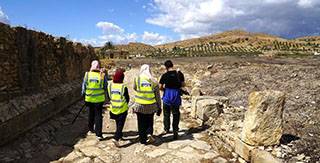
UCL Institute of Archaeology, in collaboration with Durham University and King's College London, has been awarded funding from the British Council's Cultural Protection Fund for the two-year project 'Training in Action' in Libya and Tunisia.
The UCL component of the project led by Corisande Fenwick (Co-I) and Gai Jorayev (PDRA) with assistance from members of Archaeology South-East will be responsible for training in rapid survey techniques, especially photogrammetry and UAV (Unmanned Aerial Vehicles) mapping of at-risk sites and monuments.
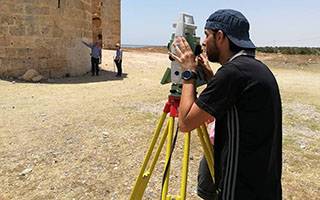
The Institut National du Patrimoine de Tunisie, The Department of Antiquities of Libya, and the Society for Libyan Studies are also partners in this multi-lateral and multi-faceted project.
This collaborative project benefits from the regional expertise and professional links of Corisande Fenwick and builds on successful training programmes in this sphere carried out by Gai Jorayev as part of the Ancient Merv project and Centre for Applied Archaeology in other parts of the world. It also benefits from UCL's expertise as one of the leading centres of innovative approaches to managing heritage at risk.
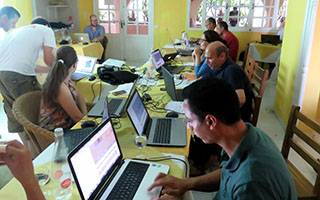
A dedicated project web-site provides more information, manuals and updates on the training programmes and ongoing collaborations. The project also maintains an active presence on social media (facebook and twitter) The first training in summer 2017 was successful and trained over 40 Libyan and Tunisian heritage specialists. Guy Hopkinson, Nathalie Gonzalez and Christopher Curtis from UCL's Archaeology South-East supported the training activities on the ground.
The partnership will continue with its local capacity building agenda in 2018. The ultimate aim is not only to support local specialists for the duration of the grant, but to build strong, long-term links between local and international partners that will result in sustained exchange of ideas, experiences and techniques of research and management.
This forms part of our wider research and capacity-building activities in the North Africa region. Corisande Fenwick and Gai Jorayev, in collaboration with Dr Moheddine Chaouali (Institut National du Patrimoine), also run training courses for Tunisian archaeology and heritage students as part of the the Tunisian-British Project at Bulla Regia.
Trainings continue - Year 2
The UCL team, working closely with other partner institutions,
organised several training sessions over the last 18 months as part of
the Training in Action project.
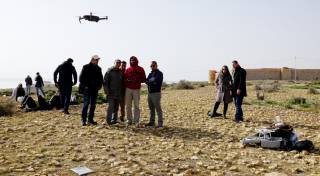
The UCL component of the project focuses on training in low-cost rapid survey techniques of cultural heritage, especially photogrammetry and UAV (Unmanned Aerial Vehicles) mapping of at-risk sites and monuments. Over the project's lifetime, these tasks evolved to integrate with the GIS and condition monitoring training undertaken by partner institutes. During training sessions, rapid documentation through photogrammetry went hand in hand with processing of the data and extracting meaningful outputs that can be used in heritage management plans, site monitoring and condition assessment, and site presentation and public engagement. The UCL team worked with participants individually where necessary and continue to support them via email and social media.
The feedback from the participants is collected at the end of each session and it shows that the trainings were received overwhelmingly positively. The feedback, both in the form of questionnaires and direct conversations with the participants, guided the approach used in the following sessions. Several manuals were prepared both in English and Arabic that target specific areas of knowledge and methodology that the participants expressed strong interest in learning deeper. The UCL team is in the process of preparing specific video tutorials that also demonstrate computer processing aspect of the training. Some of them already made available online and these will also be subtitled in Arabic.
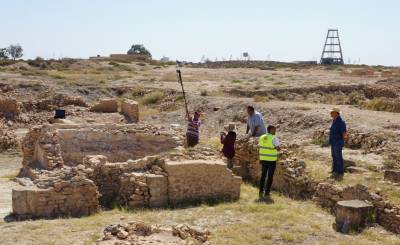
The sessions helped to create a strong network of contacts with Libyan and Tunisian heritage professionals. With the aim of mapping the long-term impact of this training programme, the team plans to continue interacting with the participants, particularly through social media, in order to see the future benefits of the training in rapid documentation. It would be very useful to see if the techniques discussed and presented are widely used at heritage management institutions across the two countries. The participants themselves, as the main specialists of heritage management in their respective countries, are in the best position to push for wider implementation of these techniques as faster and cheaper solutions for documenting heritage assets in their different forms. Continued interaction with participants will ensure that they have the technical and logistical support needed to plan and conduct photogrammetric surveys of sites, monuments and objects and to develop their technical skills in rapid documentation.
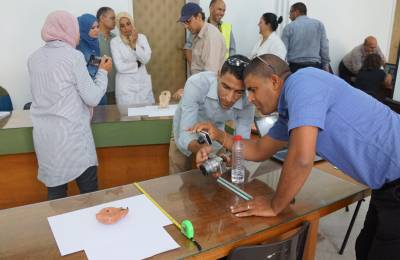
Currently, the UCL team is preparing for advanced training that will take place in early November, 2018. A selected group of Libyan and Tunisian Antiquities staff will work with trainers from three UK universities on designing and implementing complex systems of documentation, monitoring and protection of heritage assets.
Final reports of the project will be made public in early 2019.
 Close
Close

